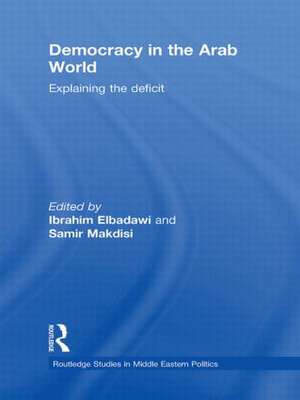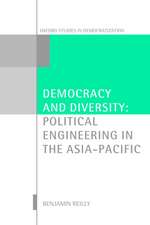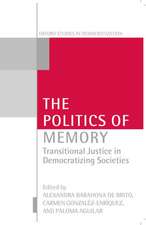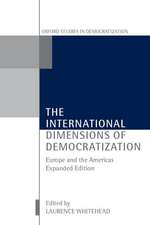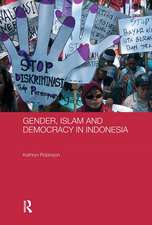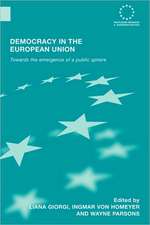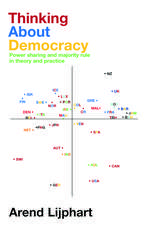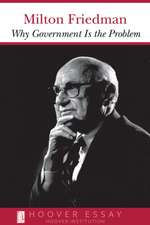Democracy in the Arab World: Explaining the Deficit: Routledge Studies in Middle Eastern Politics
Editat de Ibrahim Elbadawi, Samir Makdisien Limba Engleză Paperback – 17 noi 2010
Contributions from major scholars in the region give a cross country analysis of economic development, political institutions and social factors, and the impact of oil wealth and regional wars, and present a model for democracy in the Arab world. Case studies are drawn from Algeria, Egypt, Iraq, Jordan, Lebanon, Syria, Sudan and the Gulf region, building on these cross-country analyses and probing beyond the model’s main global variables. Looking beyond the effect of oil and conflicts, the chapters illustrate how specific socio-political history of the country concerned, fear of fundamentalist groups, collusion with foreign powers and foreign interventions, and the co-option of the elites by the state contribute to these problems of democratization.
Situating the democratic position of the Arab World in a global context, this book is an important contribution to the field of Middle Eastern politics, development studies, and studies on conflict and democracy.
| Toate formatele și edițiile | Preț | Express |
|---|---|---|
| Paperback (1) | 360.31 lei 6-8 săpt. | |
| Taylor & Francis – 17 noi 2010 | 360.31 lei 6-8 săpt. | |
| Hardback (1) | 1170.14 lei 6-8 săpt. | |
| Taylor & Francis – 10 sep 2010 | 1170.14 lei 6-8 săpt. |
Din seria Routledge Studies in Middle Eastern Politics
-
 Preț: 311.41 lei
Preț: 311.41 lei -
 Preț: 280.08 lei
Preț: 280.08 lei -
 Preț: 309.89 lei
Preț: 309.89 lei -
 Preț: 294.53 lei
Preț: 294.53 lei - 9%
 Preț: 1004.93 lei
Preț: 1004.93 lei - 18%
 Preț: 1065.06 lei
Preț: 1065.06 lei - 18%
 Preț: 1170.14 lei
Preț: 1170.14 lei - 12%
 Preț: 300.49 lei
Preț: 300.49 lei - 18%
 Preț: 1057.57 lei
Preț: 1057.57 lei - 12%
 Preț: 300.49 lei
Preț: 300.49 lei - 18%
 Preț: 1162.08 lei
Preț: 1162.08 lei - 26%
 Preț: 850.37 lei
Preț: 850.37 lei - 18%
 Preț: 1066.09 lei
Preț: 1066.09 lei - 18%
 Preț: 1057.05 lei
Preț: 1057.05 lei - 18%
 Preț: 1059.48 lei
Preț: 1059.48 lei - 18%
 Preț: 1166.01 lei
Preț: 1166.01 lei - 18%
 Preț: 1067.14 lei
Preț: 1067.14 lei - 25%
 Preț: 854.33 lei
Preț: 854.33 lei -
 Preț: 418.22 lei
Preț: 418.22 lei -
 Preț: 341.20 lei
Preț: 341.20 lei -
 Preț: 412.27 lei
Preț: 412.27 lei - 18%
 Preț: 1066.09 lei
Preț: 1066.09 lei - 18%
 Preț: 1056.00 lei
Preț: 1056.00 lei -
 Preț: 289.05 lei
Preț: 289.05 lei - 18%
 Preț: 1060.87 lei
Preț: 1060.87 lei - 18%
 Preț: 996.33 lei
Preț: 996.33 lei - 18%
 Preț: 1058.43 lei
Preț: 1058.43 lei - 18%
 Preț: 1056.00 lei
Preț: 1056.00 lei - 18%
 Preț: 1061.57 lei
Preț: 1061.57 lei - 26%
 Preț: 822.36 lei
Preț: 822.36 lei - 18%
 Preț: 1060.52 lei
Preț: 1060.52 lei - 18%
 Preț: 1439.85 lei
Preț: 1439.85 lei - 18%
 Preț: 1163.19 lei
Preț: 1163.19 lei - 18%
 Preț: 1057.75 lei
Preț: 1057.75 lei - 26%
 Preț: 821.29 lei
Preț: 821.29 lei - 18%
 Preț: 1058.79 lei
Preț: 1058.79 lei - 18%
 Preț: 1057.75 lei
Preț: 1057.75 lei - 18%
 Preț: 1056.32 lei
Preț: 1056.32 lei - 18%
 Preț: 1058.43 lei
Preț: 1058.43 lei - 25%
 Preț: 824.70 lei
Preț: 824.70 lei - 18%
 Preț: 1060.25 lei
Preț: 1060.25 lei - 18%
 Preț: 1060.87 lei
Preț: 1060.87 lei - 18%
 Preț: 1071.30 lei
Preț: 1071.30 lei - 26%
 Preț: 820.03 lei
Preț: 820.03 lei - 18%
 Preț: 1056.35 lei
Preț: 1056.35 lei - 18%
 Preț: 1057.05 lei
Preț: 1057.05 lei
Preț: 360.31 lei
Nou
Puncte Express: 540
Preț estimativ în valută:
68.95€ • 70.61$ • 57.36£
68.95€ • 70.61$ • 57.36£
Carte tipărită la comandă
Livrare economică 18 martie-01 aprilie
Preluare comenzi: 021 569.72.76
Specificații
ISBN-13: 9780415587402
ISBN-10: 0415587409
Pagini: 352
Ilustrații: 28
Dimensiuni: 156 x 234 x 19 mm
Greutate: 0.54 kg
Ediția:1
Editura: Taylor & Francis
Colecția Routledge
Seria Routledge Studies in Middle Eastern Politics
Locul publicării:Oxford, United Kingdom
ISBN-10: 0415587409
Pagini: 352
Ilustrații: 28
Dimensiuni: 156 x 234 x 19 mm
Greutate: 0.54 kg
Ediția:1
Editura: Taylor & Francis
Colecția Routledge
Seria Routledge Studies in Middle Eastern Politics
Locul publicării:Oxford, United Kingdom
Public țintă
Postgraduate and UndergraduateCuprins
Introduction Part 1: Democracy and Development: Conceptual and Cross Country Perspectives 1. Political Culture and the Crisis of Democracy in the Arab World Abdelwahab El Affendi 2. Explaining the Arab Democracy Deficit: The Role of Oil and Conflicts Ibrahim Elbadawi, Samir Makdisi and Gary Milante Part 2: Case studies – Oil, Conflict and Beyond. Mashreq Countries 3. Jordan: Propellers of Autocracy, the Arab Israeli Conflict and Foreign Power Interventions Taher Kanaan and Joseph Massad 4. Lebanon: The Constrained Democracy and its National Impact Samir Makdisi, Fadia Kiwan and Marcus Marktanner 5. Syria: The Underpinnings of Autocracy: Conflict, Oil and the Curtailment of Economic Freedom Raed Safadi, Laura Munro and Radwan Ziadeh Oil Dependent Countries 6. The Gulf Region: Beyond Oil and Wars: The Role of History and Geopolitics in Explaining Autocracy Sami Atallah 7. Algeria: Democracy and Development under the Aegis of the “Authoritarian Bargain” Belkacem Laabas and Ammar Bouhouche 8. Iraq: Understanding Autocracy: Oil and Conflict in a Historical and Socio-Political Context Eric Davis and Bassam Yousif Nile Valley Countries 9. Egypt: Development, Liberalization and the Persistence of Autocracy Gouda Abdel-Khalek and Mustapha K. Al Sayyid 10. Sudan: The Colonial Heritage, Social Polarization and the Democracy Deficit Ali Abdel Ghadir Ali and Atta El Battahani Part 3: Summing Up 11. The Democracy Deficit in the Arab World: An Interpretive Synthesis Ibrahim Elbadawi and Samir Makdisi
Notă biografică
Samir Makdisi is Professor Emeritus of Economics, Distinguished Senior Fellow, Issam Fares Institute for Public Policy and International Relations, and Founding Director at the Institute for Financial Economics at the American University of Beirut. He has served as Deputy President of AUB; as chair of the Board of Trustees at the Economic Research Forum for the Arab Countries, Iran and Turkey; on the Board of the Global Development Network; and as Minister of Economy and Trade for the Republic of Lebanon.
Ibrahim Elbadawi is Lead Economist at the Development Research Group of the World Bank. Until recently he was Lead Economist at the Development Research Group of the World Bank and has published widely on macroeconomic and development policy. His regional specialization covers Africa and the Middle East, where he is widely networked with academic research and policy forums in the two regions. He is also a visiting research fellow with the Center for Global Development and an Associate Editor of the Middle East Development Journal.
Ibrahim Elbadawi is Lead Economist at the Development Research Group of the World Bank. Until recently he was Lead Economist at the Development Research Group of the World Bank and has published widely on macroeconomic and development policy. His regional specialization covers Africa and the Middle East, where he is widely networked with academic research and policy forums in the two regions. He is also a visiting research fellow with the Center for Global Development and an Associate Editor of the Middle East Development Journal.
Recenzii
"Democracy in the Arab World is a welcome contribution to the literature examining the democracy deficit in the region. Unlike other studies that deal with democratization, the book zeroes in on the major drivers behind the democracy deficit in various Arab countries and offers a complex set of analytical explanations. Eschewing simplistic dichotomies and culturalist dogma, Democracy in the Arab World diagnosis the critical role of conflicts and oil, but also reveals the influence of political leadership, foreign interventions and the cooption of elites, in inhibiting the democratic process in the region despite its notable socio-economic development. Another major strength of the book is that it bridges the gap between theory and history. An impressive list of researchers and scholars of the region!"
Fawaz A. Gerges, London School of Economics
Fawaz A. Gerges, London School of Economics
Descriere
Despite notable socio-economic development in the Arab region, a deficit in democracy and political rights has continued to prevail. This book examines the major reasons underlying the persistence of this democracy deficit over the past decades, drawing on case studies from across the Arab world to explore economic development, political institutions and social factors, and the impact of oil wealth and regional wars.
